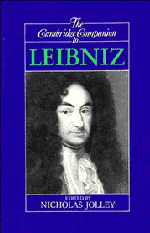Book contents
- Frontmatter
- 1 Introduction
- 2 G. W. Leibniz, life and works
- 3 The seventeenth-century intellectual background
- 4 Metaphysics: The early period to the Discourse on Metaphysics
- 5 Metaphysics: The late period
- 6 The theory of knowledge
- 7 Philosophy and logic
- 8 Philosophy and language in Leibniz
- 9 Leibniz
- 10 Leibniz's ontological and cosmological arguments
- 11 Perfection and happiness in the best possible world
- 12 Leibniz's moral philosophy
- 13 The reception of Leibniz in the eighteenth century
- Bibliography
- Index
11 - Perfection and happiness in the best possible world
Published online by Cambridge University Press: 28 May 2006
- Frontmatter
- 1 Introduction
- 2 G. W. Leibniz, life and works
- 3 The seventeenth-century intellectual background
- 4 Metaphysics: The early period to the Discourse on Metaphysics
- 5 Metaphysics: The late period
- 6 The theory of knowledge
- 7 Philosophy and logic
- 8 Philosophy and language in Leibniz
- 9 Leibniz
- 10 Leibniz's ontological and cosmological arguments
- 11 Perfection and happiness in the best possible world
- 12 Leibniz's moral philosophy
- 13 The reception of Leibniz in the eighteenth century
- Bibliography
- Index
Summary
Since all possible things have a claim to existence in God's understanding in proportion to their perfections, the result of all these claims must be the most perfect actual world which is possible.
(Leibniz, G V1 603:L 639)Candide, stunned, stupefied, despairing, bleeding, trembling, said to himself: -If this is the best of all possible worlds, what are the others like?
(Voltaire)Few philosophical theses are so renowned as Leibniz's illustrious claim that this is the best of all possible worlds. Ironically, the doctrine's great fame is due more to the ridicule it received in Candide than to broad public familiarity with Leibniz's ideas. Even among philosophers well acquainted with Leibnizian texts, the subject of God's standards of perfection has only recently begun to receive detailed discussion. Yet these standards are essential to the meaning of the best possible world doctrine, and the place of humanity in the divine scheme is at the heart of Leibniz's treatment of the problem of evil. Consequently, it behooves us to ask what canons God invokes when he compares possible worlds, and in what ways these standards affect the prospects for human well-being.
- Type
- Chapter
- Information
- The Cambridge Companion to Leibniz , pp. 382 - 410Publisher: Cambridge University PressPrint publication year: 1994
- 8
- Cited by

